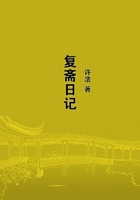Let us overleap two or three hundred years, and contemplate Europe at the commencement of the eighteenth century. Every free constitution, save one, had gone down. That of England had weathered the danger, and was riding in full security. In Denmark and Sweden, the kings had availed themselves of the disputes which raged between the nobles and the commons, to unite all the powers of government in their own hands. In France the institution of the States was only mentioned by lawyers as a part of the ancient theory of their government. It slept a deep sleep, destined to be broken by a tremendous waking. No person remembered the sittings of the three orders, or expected ever to see them renewed. Louis the Fourteenth had imposed on his parliament a patient silence of sixty years. His grandson, after the War of the Spanish Succession, assimilated the constitution of Arragon to that of Castile, and extinguished the last feeble remains of liberty in the Peninsula. In England, on the other hand, the Parliament was infinitely more powerful than it had ever been. Not only was its legislative authority fully established; but its right to interfere, by advice almost equivalent to command, in every department of the executive government, was recognised. The appointment of ministers, the relations with foreign powers, the conduct of a war or a negotiation, depended less on the pleasure of the Prince than on that of the two Houses.
What then made us to differ? Why was it that, in that epidemic malady of constitutions, ours escaped the destroying influence; or rather that, at the very crisis of the disease, a favourable turn took place in England, and in England alone? It was not surely without a cause that so many kindred systems of government, having flourished together so long, languished and expired at almost the same time.
It is the fashion to say that the progress of civilisation is favourable to liberty. The maxim, though in some sense true, must be limited by many qualifications and exceptions. Wherever a poor and rude nation, in which the form of government is a limited monarchy, receives a great accession of wealth and knowledge, it is in imminent danger of falling under arbitrary power.
In such a state of society as that which existed all over Europe during the middle ages, very slight checks sufficed to keep the sovereign in order. His means of corruption and intimidation were very scanty. He had little money, little patronage, no military establishment. His armies resembled juries. They were drawn out of the mass of the people: they soon returned to it again: and the character which was habitual prevailed over that which was occasional. A campaign of forty days was too short, the discipline of a national militia too lax, to efface from their minds the feelings of civil life. As they carried to the camp the sentiments and interests of the farm and the shop, so they carried back to the farm and the shop the military accomplishments which they had acquired in the camp. At home the soldier learned how to value his rights, abroad how to defend them.
Such a military force as this was a far stronger restraint on the regal power than any legislative assembly. The army, now the most formidable instrument of the executive power, was then the most formidable check on that power. Resistance to an established, government, in modem times so difficult and perilous an enterprise, was in the fourteenth and fifteenth centuries the simplest and easiest matter in the world. Indeed, it was far too simple and easy. An insurrection was got up then almost as easily as a petition is got up now. In a popular cause, or even in an unpopular cause favoured by a few great nobles, a force of ten thousand armed men was raised in a week. If the King were, like our Edward the Second and Richard the Second, generally odious, he could not procure a single bow or halbert. He fell at once and without an effort. In such times a sovereign like Louis the Fifteenth or the Emperor Paul would have been pulled down before his misgovernment had lasted for a month. We find that all the fame and influence of our Edward the Third could not save his Madame de Pompadour from the effects of the public hatred.
Hume and many other writers have hastily concluded, that, in the fifteenth century, the English Parliament was altogether servile, because it recognised, without opposition, every successful usurper. That it was not servile its conduct on many occasions of inferior importance is sufficient to prove. But surely it was not strange that the majority of the nobles, and of the deputies chosen by the commons, should approve of revolutions which the nobles and commons had effected. The Parliament did not blindly follow the event of war, but participated in those changes of public sentiment on which the event of war depended. The legal check was secondary and auxiliary to that which the nation held in its own hands.
There have always been monarchies in Asia, in which the royal authority has been tempered by fundamental laws, though no legislative body exists to watch over them. The guarantee is the opinion of a community of which every individual is a soldier.
Thus, the king of Cabul, as Mr. Elphinstone informs us, cannot augment the land revenue, or interfere with the jurisdiction of the ordinary tribunals.















